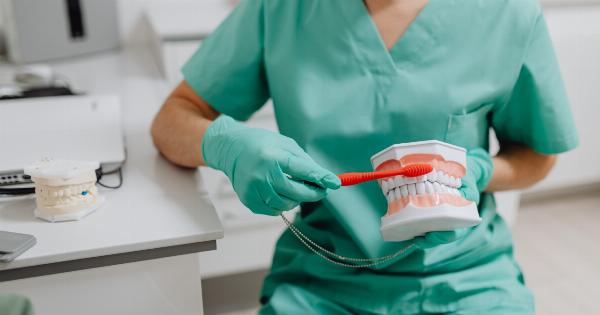Brushing our teeth is a daily task that most people take for granted. However, skipping toothbrushing can have serious consequences for our oral health.
In this article, we will discuss why skipping toothbrushing is a bad idea and why it is crucial to maintain a regular and thorough oral hygiene routine.
Poor oral hygiene leads to plaque buildup
When we skip brushing our teeth, plaque starts to build up on the tooth surfaces. Plaque is a sticky film comprised of bacteria and food particles that adhere to the teeth.
If not removed regularly, plaque hardens into tartar, which is a breeding ground for harmful bacteria. This can lead to various dental problems such as cavities, gum disease, and bad breath.
Increased risk of cavities
By not brushing our teeth, we allow plaque to accumulate on the surface of our teeth. Plaque contains bacteria that produce acids when they come into contact with sugars and carbohydrates from our diet.
These acids attack the tooth enamel, leading to the formation of cavities. Cavities can be painful and require dental intervention to restore the affected tooth.
Gum disease becomes a major concern
Skipping toothbrushing also increases the risk of developing gum disease. Plaque buildup irritates the gum tissues, causing inflammation and swelling. This early stage of gum disease is known as gingivitis.
If left untreated, gingivitis can progress to a more severe form of gum disease called periodontitis. Periodontitis can result in gum recession, tooth loss, and even increased risk of systemic diseases such as heart disease and diabetes.
Bad breath and oral odor
One of the immediate consequences of skipping toothbrushing is bad breath. The accumulation of bacteria on the teeth and tongue contributes to foul-smelling breath.
Additionally, the decomposing food particles stuck in between the teeth attract more bacteria, leading to an unpleasant odor. Regular brushing helps remove these food particles and bacteria, promoting fresh breath and better oral hygiene.
Tooth discoloration and staining
Another important reason not to skip toothbrushing is the prevention of tooth discoloration and staining.
Over time, the compounds found in food and beverages we consume (such as coffee, tea, and red wine) can cause our teeth to become stained or discolored. Brushing our teeth helps to remove the surface stains, keeping our smile bright and healthy-looking.
Impact on overall health
Poor oral hygiene can have far-reaching effects on our overall health.
The oral cavity serves as a gateway to the rest of our body, and harmful bacteria from the mouth can enter the bloodstream, potentially causing inflammation and infection in other parts of the body. There is growing evidence linking gum disease to various systemic conditions such as cardiovascular disease, diabetes, and respiratory infections.
The importance of regular dental visits
To maintain optimal oral health, regular dental visits are essential. Even if you have skipped brushing your teeth, your dentist can identify and address any possible issues that may have arisen.
Dental professionals can perform thorough cleanings, remove tartar buildup, and provide personalized oral care advice.
Tips for maintaining a consistent oral hygiene routine
Here are some tips to ensure you stick to a regular oral hygiene routine:.
- Brush your teeth at least twice a day, preferably after meals.
- Use a soft-bristled toothbrush and fluoride toothpaste.
- Don’t forget to brush your tongue to eliminate bacteria and freshen your breath.
- Floss daily to remove plaque and food particles from between the teeth.
- Consider using mouthwash to kill bacteria and freshen breath, but it should not replace brushing and flossing.
- Replace your toothbrush regularly, ideally every three to four months.
- Limit sugary and acidic foods and beverages in your diet as they can contribute to tooth decay.
- Wear a mouthguard during sports activities to protect your teeth from trauma.
- Encourage children to develop good oral hygiene habits from an early age.
- Schedule regular dental check-ups and cleanings.
Conclusion
Skipping toothbrushing is undoubtedly a bad idea. It can lead to plaque buildup, cavities, gum disease, bad breath, and tooth discoloration. Furthermore, neglecting oral hygiene can have implications for our overall health.
To maintain good oral health, it is crucial to follow a consistent oral hygiene routine and visit your dentist regularly. Remember, prevention is always better than cure when it comes to oral health.





























